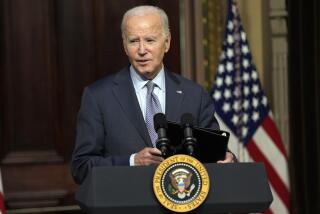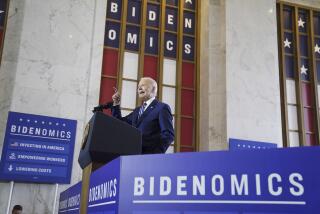Wheres that stimulus money?
- Share via
Today, Landsburg and Furman discuss the stimulus package in the context of the government’s deficit spending. Monday, the plan’s potential effect on the economy. Later in the week, they’ll debate the mortgage crisis, reasons for the economic downturn and more.
They’ll need that money back
By Steven E. Landsburg
The government wants more people working, so it’s preparing to mail out about $100 billion worth of checks. Given the goal, you’d think that it would use some of the money to reward people for working. Instead, it’s mailing out checks willy-nilly.
Suppose, for example, that we used the $150 billion to expand the Earned Income Tax Credit. To collect the EITC, you’ve got to work, and the more you work the more you collect.
The EITC is imperfect because it has two effects. It makes working people richer, which leads some of them to work less. But it also rewards work directly, which leads some of them to work more. That’s a whole lot better than the president’s plan, which is designed to have the first effect but not the second.
In terms of stimulating work, you could probably do even better by cutting the top tax rates for high earners, but that’s likely to be politically infeasible. (Whether it’s desirable is a topic for a different Dust-Up.) By sticking with the EITC, you’d be targeting benefits to lower income groups and putting a lot of people to work in the process.
The government’s resources are not infinite. If it gives out $150 billion today, it must collect an extra $150 billion in taxes tomorrow (unless the government cuts spending, which nobody seems interested in). That’s a law of arithmetic. Where will that future $150 billion come from? From the same people who are being encouraged to spend their rebate checks today. That’s why I said Monday that this whole thing is eerily similar to the sub-prime lending crisis that got us into this mess people are being encouraged to spend beyond their means and forgetting that it’s all got to be paid back someday.
The only way out is for people to actually earn more so they can afford to pay those future taxes. They can earn more only if they work more. They’ll work more only if they have the right incentives. For $150 billion, you can hand out a lot of incentives. But, Jason, the package you’re supporting is incentive-free.
Steven E. Landsburg is a professor of economics at the University of Rochester and the author, most recently, of “More Sex is Safer Sex: The Unconventional Wisdom of Economics.”
Fast-acting fiscal stimulus
By Jason Furman
Steve,
How about I respond to your questions with a multiple-choice question. The estimated number of unemployed increased by 474,000 in the month of December, bringing the total 12-month increase in the number of unemployed to 895,000. Is this because:
- People are feeling so much richer that they have decided to cut back on their work?
- The economy needs to be cleansed of its bad industries?
- The economy has hit a weak patch and needs to be stimulated?
Your posts have some flavor of “A” in them. You are quite concerned that giving people extra money will discourage them from working and instead you would like to find a solution that encourages work. While potentially true in normal times, this is not high up on the list of my worries for the economy in 2008. Your posts also seem to have a large dose of “B” a thinly veiled distaste for any attempt at countercyclical policy.
My answer is “C.” Downturns are painful. In the relatively mild 2001 recession and the aftermath that followed, the number of unemployed increased by 4 million. In a recession and its immediate aftermath, the typical family of four can see its income go down by about $5,000. The evidence suggests that far from the hopeful scenario of “creative destruction,” these economic losses are persistent and not necessarily ever recovered.
If we both agreed on “C,” then we could get down to more technocratic questions like how best to combat a potential recession. Do you think interest rate cuts are more effective than fiscal stimulus? And if we are doing fiscal stimulus, are the best policies to build infrastructure, put rebates in the pockets of working families, give money to states or give tax cuts to businesses? How should we balance the concerns about excessively low interest rates fueling another credit bubble (the downside of using monetary policy by itself) with the concern that a stronger dollar would lead to a larger trade deficit (the downside of using fiscal policy by itself)?
Elsewhere I have summarized (PDF) the evidence on the effectiveness of these different policies. But my bottom line is that well-designed fiscal stimulus appears to act more quickly than lower interest rates. This fact, together with my uncertainty about the precise effects of either policy course, lead me to favor a diversified approach that relies on both fiscal stimulus and interest rate cuts.
Your proposal to use tax changes to encourage people to work is not high up on my list of considerations for the simple reason that I do not agree with your diagnosis that changes in the unemployment rate reflect people’s desire to work. Moreover, it is incompatible with the more important goal of getting the stimulus into the economy in a timely manner. As Federal Reserve Chairman Ben Bernanke testified last week, “To be useful, a fiscal stimulus package should be implemented quickly and structured so that its effects on aggregate spending are felt as much as possible within the next 12 months or so.” For the Internal Revenue Service to be able to mail out more than 100 million checks soon, it must look at taxpayer earnings from 2007. And even you would admit that changing tax rates on decisions made in 2007 couldn’t cause those decisions to be unmade. But it is not too late to change people’s spending decisions in 2008.
Best,Jason
Jason Furman is a senior fellow and director of the Hamilton Project at the Brookings Institution. He served as a special assistant to the president for economic policy from 1999 to 2000.
| Day 2 | | |
More to Read
Inside the business of entertainment
The Wide Shot brings you news, analysis and insights on everything from streaming wars to production — and what it all means for the future.
You may occasionally receive promotional content from the Los Angeles Times.










